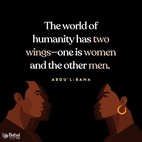The views expressed in our content reflect individual perspectives and do not represent the authoritative views of the Baha'i Faith.
Historians and medical experts rank the Great Influenza Epidemic of 1918-1920 as one of the deadliest pandemics in human history. Can we learn some lessons from that tragic history?
Because the Baha’i teachings encourage the agreement of science and religion, Baha’is believe that the answer is yes. Often called “the scientific religion,” one of the Baha’i Faith’s primary principles involves the close connection between medical science and spirituality, as expressed in this passage from the writings of Abdu’l-Baha:
There are two ways of healing sickness, material means and spiritual means. The first is by the treatment of physicians; the second consisteth in prayers offered by the spiritual ones to God and in turning to Him. Both means should be used and practised.
Illnesses which occur by reason of physical causes should be treated by doctors with medical remedies; those which are due to spiritual causes disappear through spiritual means. Thus an illness caused by affliction, fear, nervous impressions, will be healed more effectively by spiritual rather than by physical treatment. Hence, both kinds of treatment should be followed; they are not contradictory. Therefore thou shouldst also accept physical remedies inasmuch as these too have come from the mercy and favour of God, Who hath revealed and made manifest medical science so that His servants may profit from this kind of treatment also. Thou shouldst give equal attention to spiritual treatments, for they produce marvellous effects.
RELATED: Fear or Hope: Our Emotional Reaction to COVID-19
In this essay, let’s review a brief factual history of medical science as it has attempted to deal with global pandemics like the one we’re currently experiencing, to see what we can learn scientifically, and then consider the Baha’i position on the matter, to see how a scientific Faith deals with it spiritually.

The Great Influenza Epidemic: A Century Ago
Also known incorrectly by the misnomer “the Spanish flu,” the H1N1 influenza A virus likely began at a military base in Kansas in the spring of 1918, and spread across the planet to infect nearly a third of the world’s population – or some 500 million persons until the disease dwindled in 1920. Ten percent of those infected often died within hours or days from symptoms of cyanosis followed by respiratory failure. Fatality estimates, often no more than educated guesses a century ago, range between 17-100 million people.
Survivors were either traumatized or suffered long-term repercussions from diminished health. At the time, without anti-viral drugs, medicinal treatments were rudimentary by today’s standards.
In response to the Great Influenza Epidemic, face mask requirements were widely imposed, businesses were closed, social distancing was mandated, quarantines were ordered, and mass gatherings curtailed. However, these and other measures proved inconsistent. With governments either slow to respond or unable to impose strict measures of control, transmission was exacerbated by troop movements, refusal to follow health guidelines, and general public outcry over measures meant to prevent further spread.
As the epidemic ebbed and flowed, American business owners complained about financial losses. Clergy railed against church closures. Officials argued whether children were safer at home. Citizens refused to wear face masks as an infringement of their civil liberties. Social distancing was hard to enforce.
Impatient that life be normalized, Americans packed movie theaters, sporting events, religious services, family gatherings and celebratory parades. Consequent rises in cases overwhelmed hospitals. Patients had to be housed in schools, gyms, community centers, homes, and other facilities. As deaths soared, bodies piled up in funeral parlors. Devastated families dug graves for their stricken loved ones. Steam shovels were commandeered to dig mass graves. Basic services such as mail delivery, garbage collection, crop harvests, and health services were severely cut back.
Though measures to slow the progression of the disease had been invoked and proven, the mutation and spread of the virus was caused in part by human intransigence. By 1920 some 26 million Americans out of a US population of 105 million had caught the virus, resulting in 675,000 deaths. Afterward average life expectancy plummeted by a dozen years, with survivors facing an elevated future mortality risk.
The Great Influenza Epidemic, caused by a virus that attacks the respiratory system, was generated and transmitted through the air by infected persons coughing, sneezing, or talking. Healthy people – in this case, primarily the young – who inhaled the droplets or came into contact with a tainted surface could easily be infected. Once a virus like this one becomes pandemic, its virulence can become increasingly deadly as it mutates and spreads.
Today, a New Pandemic and its Unique Challenges
In the century that has passed since the Great Influenza Epidemic raged, the world has suffered through the so-called Asian flu in 1957, HIV/AIDS in 1981, and SARS in 2003. Until COVID-19 emerged in late 2019, most people carried on with their lives through these pandemics with varying degrees of normalcy. Tolls of illness and death made news, although the news had little direct impact on the population as a whole.
Covid-19, also known as SARS-CoV2, was recognized as a planetary pandemic in March 2020, and the virus has swept across the planet in four increasingly deadly waves – much like the influenza pandemic, which also generated waves of illness and death.

For Covid-19, the latest, most virulent, and deadliest mutation has been labeled the Delta variant. In infected people who have managed to recover, cases of “long Covid” have arisen. In Africa vaccine supplies are meager as deaths surge. In Japan rising infections impacted the Summer Olympics. A Chinese study in July determined that infected persons had roughly 1,000 times more copies of the virus in their respiratory tracts than found in the original Alpha variant.
The Vaccines
The scientific community responded to the Covid-19 pandemic quickly and with remarkable results. Building on more than a decade of ongoing research initiated by the SARS-CoV1 outbreak during the early 2000s, researchers developed an armamentarium of different vaccines designed to defeat the virus. In the United States, as of late August, 2021, approximately two-thirds (67.5 per cent) of the entire population had received at least one dose of a Covid-19 vaccine.
However, the upsurge in the Delta variant initially accounted for only one per cent of new infections nationally in the United States, but by the end of July 2021 the rate had risen to 93 per cent. In the three-week period from 22 July to 15 August, daily cases tripled to 140,000. Recently, an official with the National Institutes of Health (NIH) announced that they expect 200,000 new cases a day within a few weeks. Hospitals, health organizations and government officials confirm that at least 95 per cent of current Covid-19 hospital patients are unvaccinated, and 10.75 per cent of the US population currently infected.
Vaccine Skepticism
A significant minority of the population, in the United States and elsewhere, have not availed themselves of the vaccine, even though it is available without cost. Skeptics among the unvaccinated claim the vaccines are unsafe or not FDA approved, and some healthy persons insist on their right to determine the safety of their own health. Others either support various internet-popularized conspiracy theories, follow self-appointed “experts,” recall bad experiences with conventional medicine, suspect hidden politicized agendas, or just feel uneasy committing.

Statistically, though, the vaccinations have worked quite well – only .005% of the vaccinated have been hospitalized or died, and only a miniscule fraction of the vaccinated have had any serious side effects. Those who were sickened by the virus after vaccination were, for the most part, at risk owing to pre-existing comorbidities which had already compromised their immune systems.
We know, scientifically, that as long as significant numbers of people remain unvaccinated, the virus can and will continue to spread and further mutate. Its virulence has been linked to the intransigence of record numbers of people who refuse to take precautionary measures familiar a century ago, as well as the anti-vaccination cohort of the population. If not brought under control, the Delta variant can potentially infect half the unvaccinated population within the next year – and endanger the vaccinated as it further mutates into more deadly strains. In a recent week in August, nearly 94,000 American children were infected.
RELATED: Why We Can’t Forget the Pandemic’s Hard-Earned Lessons
What Do Baha’is Think?
Baha’is are free to make their own individual decisions regarding medical questions, but in deciding they take into account the Baha’i writings and the guidance of the Universal House of Justice, which has stated:
… advances in medical science have led to the production of effective vaccines, the use of which has freed humanity from many debilitating and deadly infectious diseases. Reports indicate that the coronavirus vaccines currently being developed offer great promise for protecting individuals from, and helping to reduce transmission of, the virus.
The Universal House of Justice has also advised:
In relation to the coronavirus pandemic, (Baha’is) should follow the counsel of medical and other scientific experts on the advisability and efficacy of the various vaccination options that are becoming available and the wisdom of particular public health measures. They should not be concerned merely with their own personal choices and well-being, but in reaching their decisions, they should also consider their social responsibilities and the common good.
This means, for Baha’is and all other people who believe in the oneness of humanity, that vaccination is not just a personal decision, but instead represents a public health decision for the collective protection and well-being of the entire human family. The Universal House of Justice cited that exact principle in their message on vaccination:
… the purpose of being vaccinated extends beyond the protection it affords the individual concerned; namely, that when a large enough proportion of the population is vaccinated, the spread of a disease amongst them is retarded, thereby protecting those who – for whatever reason – are unable to be vaccinated.
Coronavirus is a world-encircling pandemic. All countries and peoples are affected, as the virus is no respecter of national borders, but each country is affected differently depending on how peoples and governments respond to safety measures. Given the seriousness of the Delta variant and future variants, control of the virus may mean inoculating 90% of the world’s population; an undertaking that will ultimately require the cooperation of both world leaders and world citizens.

















Comments
Sign in or create an account
Continue with Googleor